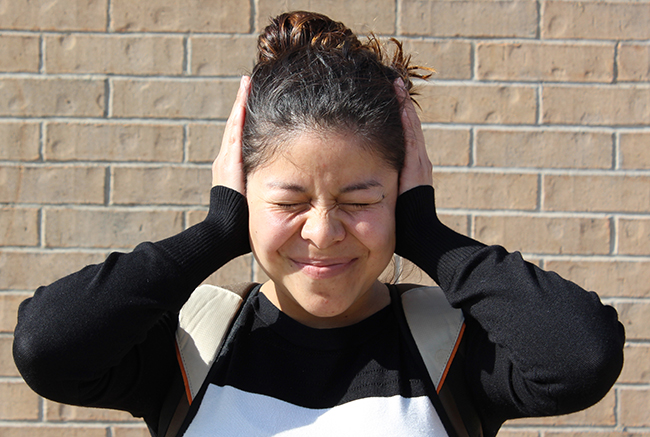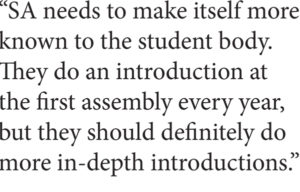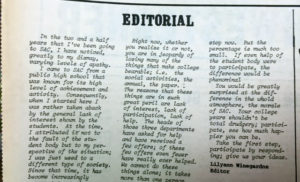The Great Disconnect: Part 1 The Problem of Apathy
 Apathy. It’s the feeling you get when you’re no longer excited about that package you ordered in the mail two weeks ago, or when you’ve stopped caring what they serve in the cafeteria because the cycle of food has gotten stale. We have all experienced it and we’ve all felt it. It’s our brain’s way of coping with the monotony of day-to-day routines. After attending Southwestern Adventist University for four years, I’ve seen all levels of apathy, at one time or another, expressed by the student body. But there is one area of apathy that has been consistent from a time long before mine: The SWAU Student Association.
Apathy. It’s the feeling you get when you’re no longer excited about that package you ordered in the mail two weeks ago, or when you’ve stopped caring what they serve in the cafeteria because the cycle of food has gotten stale. We have all experienced it and we’ve all felt it. It’s our brain’s way of coping with the monotony of day-to-day routines. After attending Southwestern Adventist University for four years, I’ve seen all levels of apathy, at one time or another, expressed by the student body. But there is one area of apathy that has been consistent from a time long before mine: The SWAU Student Association.
As part of our Reporting III class during Fall Semester 2016, my fellow communication student Herman Aguilar and I were tasked with investigating the overall relationship between the student body and the SA: not only in the present, but in the long term. We conducted and recorded a series of interviews across campus as well as reviewed many current and historical documents on campus. After talking to many in the student body for the past few months about the efficiency and overall outlook of the SA, I found many of the same concerns repeated time and time again: the SA only does events. They don’t tackle real issues on campus. They don’t ask us what WE want. The list could go on.
This may be simply because very few students know who their SA representatives are. Jerome Pondexter II, a junior communication major, stated that SA officers need to make their presence more known on campus.
 “SA needs to make themselves more known to the student body,” says Pondexter. “I mean, yes, they do an introduction at the first assembly every year, but they should definitely do more in-depth introductions.”
“SA needs to make themselves more known to the student body,” says Pondexter. “I mean, yes, they do an introduction at the first assembly every year, but they should definitely do more in-depth introductions.”
This sentiment seems to reflect those of many in the student body, especially freshmen. Students on and off campus feel as if the SA doesn’t meet their needs. Interestingly however, when students are asked if they had ever voice these concerns to their SA officers and parliamentarians, nine out of ten times the answer was ‘no’, either because they didn’t feel like being bothered, or because they simply didn’t know who they needed to talk to. In looking at student associations of the past, many of the SA officials released “Meet Your SA” articles in The Southwesterner to encourage student communication and dialogue, even answering questions the students would write in to them. That method has since disappeared.
This may be the beginning of more issues. There has been an admitted disconnect between the student body and the SA on both sides. Many of the SA officers themselves, both in the past and in the present, have admitted that consistent communications between the student body and themselves have been difficult at best. Webmail, text alerts, and word of mouth only go so far. Each student in the student body must actively choose what events to attend and what activities to participate in. Interest is not something that can be manufactured or given by SA officials.
When we vote in SA officers, we vote them in as student advocates: people who will work with and for the school on our behalf. But it seems that sometimes we forget what our part in the process is. Many of the students I talked to had a lot of great ideas for the SA events and fundraisers, as well as policies that could help improve student life on campus. Yet when asked if they had brought these ideas to their SA representatives, I was often met with disinterest in presenting the idea or worse, confusion regarding who to even talk to about getting them underway. This is obviously an issue with communication. Being a journalist, you learn very quickly that information needs to go both ways. Nobody on this planet is a psychic.

A 1978 editorial in the campus newspaper The Southwesterner expressed concern about apathy on campus. What has changed?
In 1978, then-editor of the Southwesterner newspaper Lilyann Winegardner wrote an editorial regarding perceived apathy on the Southwestern campus. Having come from a public school setting where students expressed high excitement at the achievements of the school, she expressed her shock at the fact that that excitement was missing in the student body of [Southwestern Adventist College], and the general lack of care to help support school activities:
“Right now, whether you realize it or not, you are in jeopardy of losing many of the things that make this college bearable: the social activities, the annual, the paper. The reasons these things are in such great peril are lack of interest, lack of participation, lack of help.”
Almost forty years later, much of that same apathy still exists. The students of Southwestern still feel as strong a disconnect between the student body and this SA as there has ever been. This problem is not a new one, yet it seems as if it needs new solutions. The same tactics that were tried decades ago to encourage students to take an active part in the governing process of SWAU still don’t seem to work today.
But what do the SA officers think about all this? Do they acknowledge this disconnect, or do they think the job they are doing is sufficient? Are they truly our advocates, or have they just taken the office to add their resume?
Tomorrow Herman Aguilar will continue this series with his article that invites responses from our own Student Association officers. Make sure you read it.
About author
You might also like
NBA Veteran Speaks for Assembly
Thursday’s assembly at Southwestern featured former professional basketball player Maurice Evans. During his 10-year NBA career, Evans played for the Minnesota Timberwolves, Los Angeles Lakers, and Orlando Magic. He is
Mimosa! SA’s Financial VP Shares What’s In Store for Students
By Ephraim Viadex This year’s Mimosa is coming quickly, and many students have questions and concerns regarding Southwestern Adventist University’s storied end-of-year event. Fortunately, the SA’s Financial Vice President Dulce






0 Comments
No Comments Yet!
You can be first to comment this post!